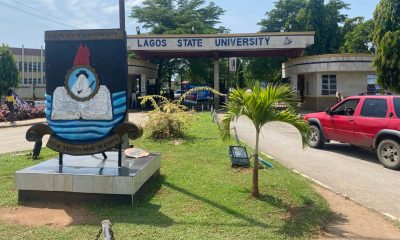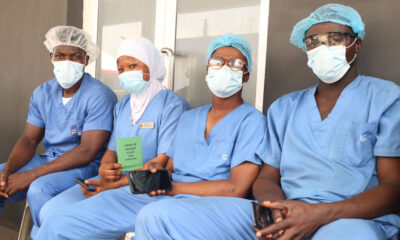International
Hezbollah drone strike kills four, wounds dozens at Israeli base

Hezbollah drone strike kills four, wounds dozens at Israeli base
Beirut: Israel’s military said a Hezbollah drone killed four soldiers at one of its northern bases Sunday, as it expanded its bombardments of Lebanon and troops battled militants across the border.
The attack on a military training camp in Binyamina, near Haifa, was the deadliest such assault on an Israeli base since September 23, when Israel increased its attacks on Hezbollah in Lebanon. Emergency services reported more than 60 wounded.
Authorities in Gaza, meanwhile, said the death toll from an Israeli strike Sunday on a school being used as a shelter for displaced people had risen to 15, including whole families, while a separate overnight strike on a hospital killed four.
And as fighting raged between Israel and Hezbollah forces in Lebanon’s south, United Nations peacekeepers said they had again been in the firing line.
They said Israeli troops “forcibly” entered a UN position with two tanks, after Israeli Prime Minister Benjamin Netanyahu called on the force to withdraw from the area.
Israel’s military said a tank had backed into the UN post while under fire.
Iran-backed Hezbollah said late Sunday that it launched “a squadron of attack drones” at the Binyamina camp, around 30 kilometers (20 miles) south of the major city of Haifa.
The strike was in response to Israeli attacks, including air strikes on Thursday that Lebanon’s health ministry said killed at least 22 people in central Beirut.
In a later statement, Hezbollah warned Israel that “what it witnessed today in southern Haifa is nothing compared to what awaits it if it decides to continue its aggression against our noble and dear people.”
An Israeli volunteer rescue service, United Hatzalah, said its teams in Binyamina assisted “over 60 wounded people” with injuries ranging from mild to critical.
Hezbollah has been firing rockets and drones into Israel for more than a year in support of Hamas militants in Gaza.
Since late September, however, its strikes have reached further into the country.
READ ALSO:
- Trump urges using military against ‘enemy from within’ on Election Day
- Man with two guns, fake passports arrested near Trump rally
- Teenage tricycle rider murdered in Delta, mob sets killer ablaze
Israel’s sophisticated air defenses have intercepted most of the projectiles, with few casualties caused by strikes or falling debris.
Israel’s recent strikes have increasingly focused on areas beyond Hezbollah’s traditional strongholds in southern Beirut, and Lebanon’s south and east.
Israel said its air force hit “Hezbollah launchers, anti-tank missile posts, weapons storage facilities” and other targets, while on the ground its soldiers “eliminated dozens” of fighters.
Lebanon’s official National News Agency said Israeli forces had “escalated their attacks” on southern Lebanon with “successive air strikes” pounding several border villages.
It later reported that an Israeli strike on Mayfadoun, near Nabatiyeh, in southern Lebanon, had killed five people and wounded one other.
Hezbollah said its forces clashed several times with Israeli troops who tried to “infiltrate” villages along the border.
Before the drone strike it had said it launched a salvo of rockets at a “base in southern Haifa.”
The group later aired an audio recording of its slain leader Hassan Nasrallah calling on fighters to “defend this holy and blessed land and this honorable people.”
Nasrallah was killed in an Israeli air strike in south Beirut on September 27, and several other senior commanders of the movement have also been killed.
Israel’s military said about 115 projectiles fired by Hezbollah had crossed into Israeli territory by Sunday afternoon.
A Hezbollah fighter was captured emerging from a tunnel in south Lebanon on Sunday, Israel’s military said, the first such announcement since the start of the ground offensive.
UN peacekeepers accused Israeli troops of breaking through a gate and entering one of their positions before dawn Sunday in south Lebanon, the latest of several incidents the UNIFIL mission has reported since Thursday.
Five Blue Helmets have so far been injured, provoking international condemnation.
“Two IDF (Israeli military) Merkava tanks destroyed the position’s main gate and forcibly entered the position” in the Ramia area, before leaving 45 minutes later, UNIFIL said.
The Israeli military later said a tank “backed several meters into a UNIFIL post” while “under fire” and attempting to evacuate injured soldiers.
READ ALSO:
- We’ve agreed to boycott Libya match over poor treatment – S’Eagles captain Troost-Ekong
- Protesters kill many burn houses, police station in Edo over kidnap
- Police smash organ harvesting syndicate in Imo
Earlier Sunday, Netanyahu had called on the UN to move peacekeepers in southern Lebanon out of harm’s way, after the mission rejected requests to abandon its positions.
The peacekeepers’ presence had “the effect of providing Hezbollah terrorists with human shields,” said Netanyahu.
UN chief Antonio Guterres on Sunday said “attacks” against peacekeepers “may constitute a war crime.”
UNIFIL, with about 9,500 troops, is in southern Lebanon under the longstanding UN Security Council Resolution 1701, which stipulated that only the Lebanese army and UN peacekeepers should be deployed in south Lebanon.
Three Lebanese soldiers were wounded on Sunday, the country’s army said, when Israeli forces fired on military vehicles in the Marjayoun area.
French President Emmanuel Macron, in a phone call with Iran’s President Masoud Pezeshkian, appealed to Tehran to support “a general de-escalation” in Lebanon and Gaza, his office said.Gaza’s civil defense agency said Israeli shelling had killed at least 15 people and wounded dozens more Sunday at a school turned shelter for displaced Palestinians in central Gaza’s Nuseirat camp.
“The school was bombarded with a large volley of Israeli artillery, resulting in an initial death toll of 15 martyrs, including children, women and entire families, and 50 wounded,” said Mahmud Bassal, spokesman for the agency.
Israel’s military said it was “looking into the reports.”
Separately, the military said early Monday that it had carried out a strike targeting a “command and control center, which was embedded inside a compound that previously served as the ‘Shuhadah Al-Aqsa’ hospital.”
Civil defense spokesman Bassal said the strike had killed four people and wounded many more, noting it was the seventh time an attack had hit the “tents for displaced people inside the walls of Al-Aqsa Martyrs Hospital.”
World Health Organization chief Tedros Adhanom Ghebreyesus said late Sunday that a WHO-Palestine Red Crescent operation had managed to resupply two hospitals in northern Gaza.
“WHO and partners finally managed to reach Kamal Adwan and Al-Sahaba hospitals yesterday after 9 attempts this past week,” he posted on X.
Hamas sparked the war in Gaza with the deadliest-ever attack on Israel on October 7, 2023, which resulted in the deaths of 1,206 people, mostly civilians, according to an AFP tally of official Israeli figures.
The number includes hostages killed in captivity.
The health ministry in Hamas-run Gaza says more than 42,000 people, the majority civilians, have been killed since Israel’s military campaign began there. The UN considers these figures to be reliable.
Israeli strikes in Lebanon have killed more than 1,300 people since September 23, according to an AFP tally of official figures, including for Saturday.
That toll exceeds the entire Lebanese toll of 1,200 — mostly civilians — in the last Hezbollah-Israel war in 2006, when 160 people, mostly soldiers, died in Israel.
The Pentagon said it would deploy a high-altitude anti-missile system and its US military crew to Israel to help the ally protect itself from potential Iranian attack.
Hezbollah drone strike kills four, wounds dozens at Israeli base
International
Syria not threat to world, rebel leader al-Sharaa tells BBC
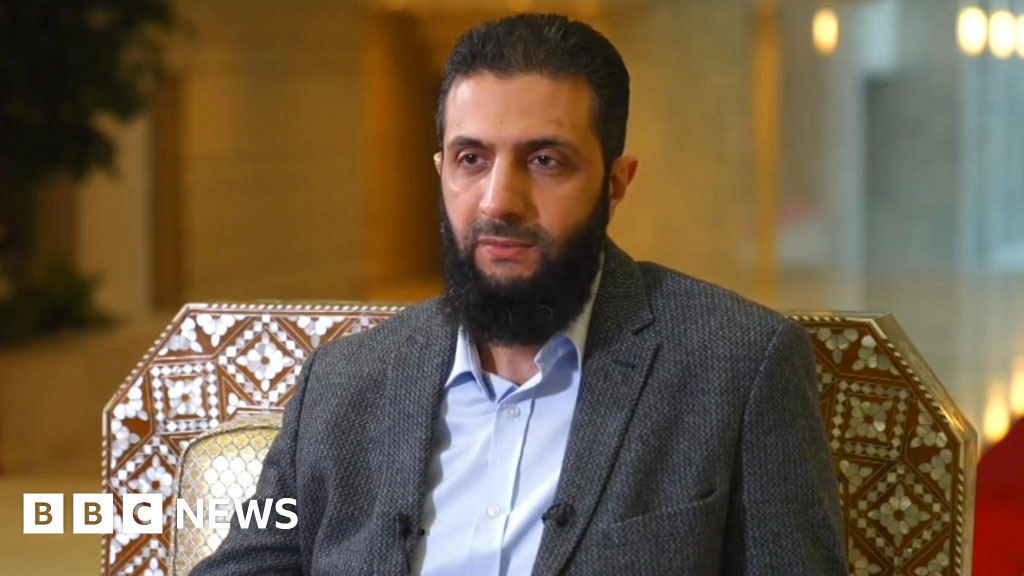
Syria not threat to world, rebel leader al-Sharaa tells BBC
The de facto leader of Syria, Ahmed al-Sharaa, has said the country is exhausted by war and is not a threat to its neighbours or to the West.
In an interview with the BBC in Damascus, he called for sanctions on Syria to be lifted.
“Now, after all that has happened, sanctions must be lifted because they were targeted at the old regime. The victim and the oppressor should not be treated in the same way,” he said.
Sharaa led the lightning offensive that toppled Bashar al-Assad’s regime less than two weeks ago. He is the leader of the Hayat Tahrir al-Sham (HTS), the dominant group in the rebel alliance, and was previously known by his nom de guerre of Abu Mohammed al-Jolani.
He said HTS should be de-listed as a terrorist organisation. It is designated as one by the UN, US, EU and UK, among many others, as it started as a splinter group of al-Qaeda, which it broke away from in 2016.
Sharaa said HTS was not a terrorist group.
They did not target civilians or civilian areas, he said. In fact, they considered themselves to be victim of the crimes of the Assad regime.
He denied that he wanted to turn Syria into a version of Afghanistan.
READ ALSO:
- Tinubu’s 2025 budget will increase poverty, worsen economy – PDP
- Real Madrid outclass Pachuca to win FIFA Intercontinental Cup
- Israel hits ports, energy sites in Yemen after missile intercepted
Sharaa said the countries were very different, with different traditions. Afghanistan was a tribal society. In Syria, he said, there was a different mindset.
He said he believed in education for women.
“We’ve had universities in Idlib for more than eight years,” Sharaa said, referring to Syria’s north-western province that has been held by rebels since 2011.
“I think the percentage of women in universities is more than 60%.”
And when asked whether the consumption of alcohol would be allowed, Sharaa said: “There are many things I just don’t have the right to talk about because they are legal issues.”
He added that there would be a “Syrian committee of legal experts to write a constitution. They will decide. And any ruler or president will have to follow the law”.
Sharaa was relaxed throughout the interview, wearing civilian clothes, and tried to offer reassurance to all those who believe his group has not broken with its extremist past.
Many Syrians do not believe him.
The actions of Syria’s new rulers in the next few months will indicate the kind of country they want Syria to be – and the way they want to rule it.
Syria not threat to world, rebel leader al-Sharaa tells BBC
BBC
International
Israel hits ports, energy sites in Yemen after missile intercepted
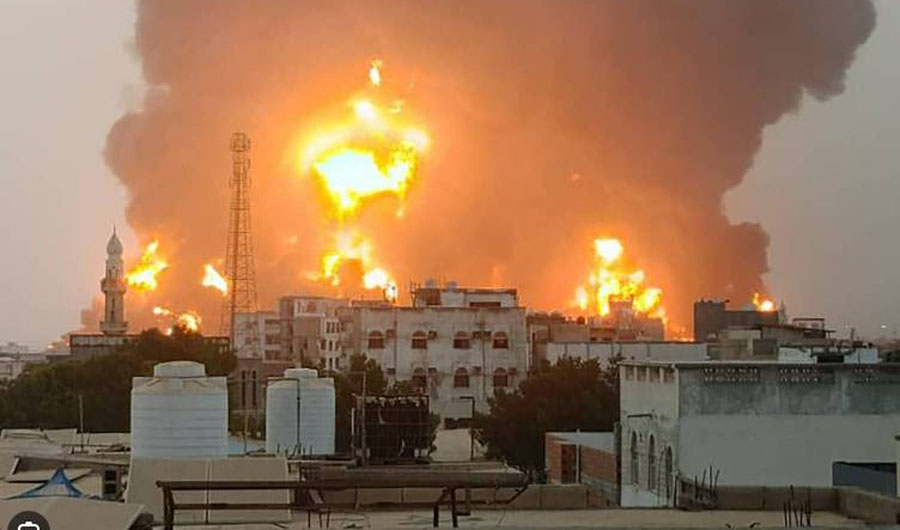
Israel hits ports, energy sites in Yemen after missile intercepted
JERUSALEM: Israel said Thursday it struck ports and energy infrastructure it alleges are used by Houthi militants, after intercepting a missile fired by the group.
Israel’s military said it “conducted precise strikes on Houthi military targets in Yemen — including ports and energy infrastructure in Sanaa, which the Houthis have been using in ways that effectively contributed to their military actions.”
The announcement came shortly after Israel said it had intercepted a missile fired from Yemen.
Al-Masira, a media channel belonging to the Houthis, said a series of “aggressive raids” were launched in the Yemeni capital of Sanaa and the port city of Hodeidah.
It reported raids that “targeted two central power plants” in Yemen’s capital Sanaa, while in Hodeidah it said “the enemy launched four aggressive raids targeting the port… and two raids targeting” an oil facility.
The strikes were the second time this week that Israel’s military has intercepted a missile from Yemen.
On Monday, the Houthis claimed a missile launch they said was aimed at “a military target of the Israeli enemy in the occupied area of Yaffa” — a reference to Israel’s Tel Aviv area.
READ ALSO:
- Gaza mediators intensify ceasefire efforts, Israeli strikes kill 20 people
- PDP expels South-East national vice chairperson over anti-party activities
- Your information on $1bn investment misleading, Dangote Refinery replies NNPCL
Also Monday, an Israeli navy missile boat intercepted a drone in the Mediterranean after it was launched from Yemen, the military said.
The Houthi militants have said they are acting in solidarity with Palestinians and pledged Monday to continue operations “until the aggression on Gaza stops and the siege is lifted.”
On December 9, a drone claimed by Houthis exploded on the top floor of a residential building in the central Israel city of Yavne, causing no casualties.
In July, a Houthi drone attack in Tel Aviv killed an Israeli civilian, prompting retaliatory strikes on the Yemeni port of Hodeidah.
The Houthis have also regularly targeted shipping in the Red Sea and the Gulf of Aden, leading to retaliatory strikes on Houthi targets by United States and sometimes British forces.
Israeli military spokesman Daniel Hagari said the group had become a “global threat,” pointing to Iran’s support for the militants.
“We will continue to act against anyone, anyone in the Middle East, that threatens the state of Israel,” he said.
Israel hits ports, energy sites in Yemen after missile intercepted
International
Gaza mediators intensify ceasefire efforts, Israeli strikes kill 20 people
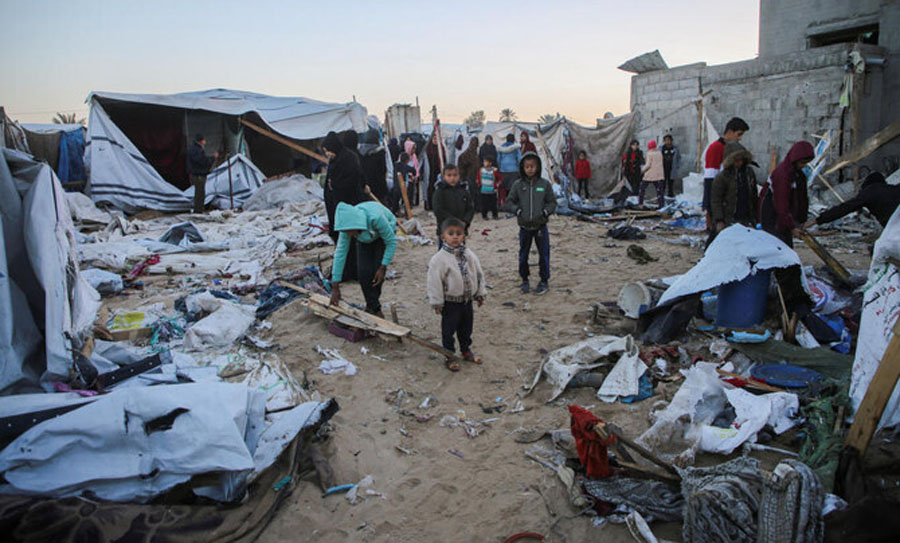
Gaza mediators intensify ceasefire efforts, Israeli strikes kill 20 people
CAIRO: The United States, joined by Arab mediators, sought on Wednesday to conclude an agreement between Israel and Hamas to halt the 14-month-old war in the Gaza Strip where medics said Israeli strikes killed at least 20 Palestinians overnight.
A Palestinian official close to the negotiations said on Wednesday that mediators had narrowed gaps on most of the agreement’s clauses. He said Israel had introduced conditions which Hamas rejected but would not elaborate.
On Tuesday, sources close to the talks in Cairo, the Egyptian capital, said an agreement could be signed in coming days on a ceasefire and a release of hostages held in Gaza in return for Palestinian prisoners held by Israel.
Medics said an Israeli airstrike killed at least 10 people in a house in the northern town of Beit Lahiya while six were killed in separate airstrikes in Gaza City, Nuseirat camp in central areas, and Rafah near the border with Egypt.
In Beit Hanoun in the northern Gaza Strip, medics said four people were killed in an airstrike on a house. There was no immediate comment from the Israeli military spokesman.
Israeli forces have operated in the towns of Beit Hanoun and Beit Lahiya as well as the nearby Jabalia camp since October, in a campaign the military said aimed to prevent Hamas militants from regrouping.
Palestinians accuse Israel of carrying out acts of “ethnic cleansing” to depopulate the northern edge of the enclave to create a buffer zone. Israel denies it.
READ ALSO:
- PDP expels South-East national vice chairperson over anti-party activities
- Your information on $1bn investment misleading, Dangote Refinery replies NNPCL
- Many die at Ibadan children’s Christmas party stampede, organisers arrested
Hamas does not disclose its casualties, and the Palestinian health ministry does not distinguish in its daily death toll between combatants and non-combatants.
On Wednesday, the Israeli military said it struck a number of Hamas militants planning an imminent attack against Israeli forces operating in Jabalia.
Later on Wednesday, Muhammad Saleh, director of Al-Awda Hospital in Jabalia, said Israeli shelling in the vicinity damaged the facility, wounding seven medics and one patient inside the hospital.
The Israeli military had no immediate comment.
In the Central Gaza camp of Bureij, Palestinian families began leaving some districts after the army posted new evacuation orders on X and in written and audio messages to mobile phones of some of the population there, citing new firing of rockets by Palestinian militants from the area.
CEASEFIRE GAINS MOMENTUM
The US administration, joined by mediators from Egypt and Qatar, has made intensive efforts in recent days to advance the talks before President Joe Biden leaves office next month.
In Jerusalem, Israeli President Isaac Herzog met Adam Boehler, US President-elect Donald Trump’s designated envoy for hostage affairs. Trump has threatened that “all hell is going to break out” if Hamas does not release its hostages by Jan. 20, the day Trump returns to the White House.
CIA Director William Burns was due in Doha on Wednesday for talks with Qatari Prime Minister Sheikh Mohammed bin Abdulrahman Al-Thani on bridging remaining gaps between Israel and Hamas, other knowledgeable sources said. The CIA declined to comment.
Israeli negotiators were in Doha on Monday looking to bridge gaps between Israel and Hamas on a deal Biden outlined in May.
There have been repeated rounds of talks over the past year, all of which have failed, with Israel insisting on retaining a military presence in Gaza and Hamas refusing to release hostages until the troops pulled out.
The war in Gaza, triggered by a Hamas-led attack on communities in southern Israel that killed some 1,200 people and saw more than 250 abducted as hostages, has sent shockwaves across the Middle East and left Israel isolated internationally.
Israel’s campaign has killed more than 45,000 Palestinians, displaced most of the 2.3 million population and reduced much of the coastal enclave to ruins.
Gaza mediators intensify ceasefire efforts, Israeli strikes kill 20 people
ARAB NEWS
-

 metro2 days ago
metro2 days agoCourt stops customs from seizing imported rice in open market
-

 Railway12 hours ago
Railway12 hours agoLagos Rail Mass Transit part of FG free train ride – NRC
-

 metro3 days ago
metro3 days agoFG transfers electricity market regulatory oversight in Lagos to LASERC
-

 metro2 days ago
metro2 days agoAfe Babalola: Court grants Dele Farotimi bail, barred from media interviews
-

 metro2 days ago
metro2 days agoIbadan stampede: Tinubu orders probe as death toll hits 40
-

 News2 days ago
News2 days agoAdebayo Ogunlesi, 2 other Nigerians make Forbes 50 wealthiest Black Americans list 2024
-

 metro2 days ago
metro2 days agoNAFDAC seizes N5bn fake rice, seals factory in Nasarawa
-
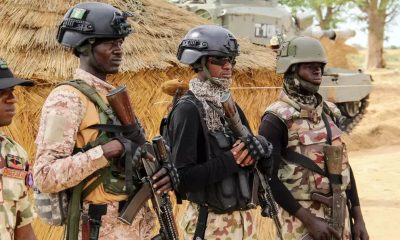
 metro3 days ago
metro3 days agoAbuja demolition: Soldiers attack FCTA officials, seize vehicles

